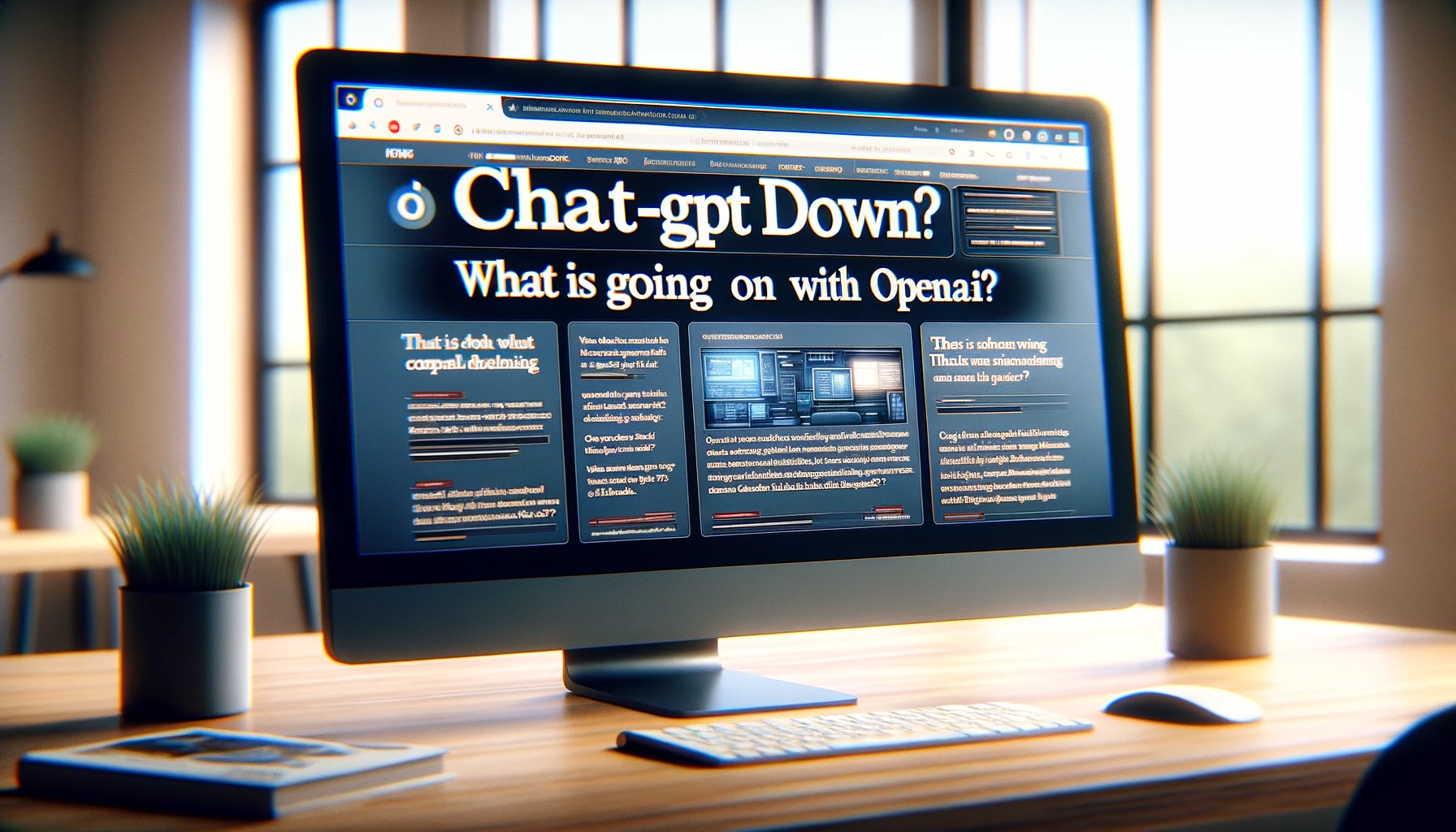Kittl VS Canva: Is Kittl the Best AI Design Platform?

Hello there, dear reader! Are you curious about the recent buzz surrounding OpenAI and its famous offspring, ChatGPT? Well, you’ve come to the right place! In this article, we’re diving deep into the heart of these intriguing developments. So, grab a cup of your favorite beverage, and let’s unravel this tech mystery together!
Table of Contents
What is OpenAI?
OpenAI, a name that’s been echoing through the halls of Silicon Valley, is more than just a company. It’s a pioneering force in the realm of artificial intelligence. Founded with the noble vision of ensuring AI benefits all of humanity, OpenAI has been the brain behind some of the most fascinating AI developments in recent years. From the versatile ChatGPT to the imaginative Dall-E, OpenAI’s creations have not just captured our imaginations but have also raised important questions about the future of AI.
What Is Going On With OpenAI?
OpenAI stands as a beacon of innovation and controversy in the ever-evolving landscape of artificial intelligence. Recently, the company has found itself in the eye of a storm, a whirlwind of events that have left the tech world buzzing with questions and speculations. So, what exactly is happening within the walls of this AI powerhouse?
To begin with, the sudden firing of CEO Sam Altman has been the most startling development. Altman, a prominent figure in the AI community, was instrumental in catapulting OpenAI to its current status. His dismissal, therefore, isn’t just a routine change in leadership; it’s a move that signals potential shifts in the company’s direction and philosophy. The board’s decision, citing a lack of transparency in Altman’s communications, hints at possible internal conflicts and strategic disagreements. This change at the helm raises questions about the future course of OpenAI, especially in its approach to AI development and commercialization.
But the drama doesn’t end there. The aftermath of Altman’s departure has been equally tumultuous. Reports suggest a divide within the company, with a significant portion of the staff expressing discontent and even threatening to resign. This internal upheaval is not just a matter of corporate politics; it reflects the challenges that OpenAI faces in balancing its ambitious AI goals with ethical considerations and commercial pressures.
Moreover, amidst this internal chaos, OpenAI’s flagship product, ChatGPT, experienced a notable outage. Users across the globe reported issues with the AI chatbot, fueling concerns about the stability and scalability of OpenAI’s technology. While outages in tech are not uncommon, the timing of this incident, coinciding with the company’s internal strife, has led to speculation about the underlying causes and the robustness of OpenAI’s infrastructure.
Adding another layer to this complex situation is OpenAI’s relationship with Microsoft. The tech giant, a major investor in OpenAI, has been closely linked with the company’s strategic decisions. The dynamics of this partnership, especially in the wake of recent events, could significantly influence OpenAI’s direction, both in terms of technology development and market positioning.
In essence, OpenAI is at a crossroads. The company, once celebrated for its groundbreaking work in AI, is now grappling with challenges that are as much about corporate governance and ethical AI development as they are about technological innovation. How OpenAI navigates these turbulent waters will not only shape its own future but also have far-reaching implications for the broader AI landscape.

Why Was Altman fired?
The departure of Sam Altman from the helm of OpenAI has sent ripples through the tech community, raising a cloud of questions and theories. Altman, a figure synonymous with OpenAI’s rise to prominence in the AI world, was more than just a CEO; he was a visionary leader whose ambitions and actions shaped the company’s trajectory. So, why was such a pivotal figure shown the door?
The official statement from OpenAI’s board cited a lack of candor in Altman’s communications as the primary reason for his dismissal. This phrase, while seemingly straightforward, opens a Pandora’s box of interpretations and implications. In the world of corporate governance, “lack of candor” can point to a range of issues, from miscommunication and withholding information to potentially more serious breaches of trust. It suggests a breakdown in the essential trust and transparency required between a CEO and the board of directors.
However, the story likely goes deeper than what’s encapsulated in the official statement. Altman’s firing could be indicative of underlying tensions within OpenAI, possibly related to the company’s direction, strategy, or ethical stance on AI development. As AI technology continues to advance at a breakneck pace, ethical considerations and responsible AI development have become hot-button issues. It’s plausible that disagreements on how to balance these concerns with commercial ambitions played a role in the board’s decision.
Furthermore, Altman’s entrepreneurial spirit and forward-thinking approach, while instrumental in driving innovation, might have clashed with more conservative or risk-averse elements within the company or its board. The rapid growth and high public profile of OpenAI’s projects, like ChatGPT and Dall-E, bring not just opportunities but also significant responsibilities and risks. Managing these effectively requires a delicate balance, and differing visions on how to achieve this balance could have contributed to the decision.
It’s also important to consider the broader context of the AI industry and its stakeholders. OpenAI, initially founded as a non-profit with a mission to democratize AI, has evolved significantly, especially with its for-profit arm and partnerships with major corporations like Microsoft. This evolution might have necessitated a change in leadership to align with new strategic goals or to navigate the complex landscape of partnerships, investor expectations, and regulatory environments.
In summary, while the official reason for Altman’s firing points to a lack of candor, the reality is likely a complex tapestry woven from internal dynamics, strategic disagreements, and the challenges of steering a leading AI company in an increasingly complex and scrutinized industry. Altman’s departure marks not just a change in leadership but also a pivotal moment in OpenAI’s journey, signaling potential shifts in its approach to AI development and its role in the broader tech ecosystem.
Is ChatGPT OFFLINE Now?
In the midst of this corporate drama, users of ChatGPT have been facing their own challenges. Reports of the chatbot being offline have been circulating, leaving many wondering if this is a temporary glitch or a sign of deeper troubles within OpenAI. Let’s investigate the current status of ChatGPT and what it means for its legions of users.
Is ChatGPT At Capacity Right Now?
Lately, users of ChatGPT, OpenAI’s revolutionary AI chatbot, have been facing glitches and delays, sparking questions about its capacity. Is ChatGPT overwhelmed by its own success? Indeed, the surge in user numbers and complex queries seems to have pushed the system to its limits. However, ‘at capacity’ for AI systems like ChatGPT is a fluid concept. OpenAI is continuously working to expand and optimize its infrastructure to meet the growing demand. While current signs point to capacity strains, OpenAI’s efforts in scaling and efficiency improvements suggest that these are temporary challenges in ChatGPT’s rapidly evolving journey.
When Could ChatGPT Get Fixed?
For those eagerly awaiting ChatGPT’s return to full functionality, the big question is: when will things get back to normal? We’ll look at OpenAI’s track record, the nature of the issues at hand, and what the company has said about resolving these challenges.
What Is The Relationship Between OpenAI And Microsoft?
In the backdrop of all these developments is the relationship between OpenAI and tech giant Microsoft. This partnership, which has been both fruitful and complex, plays a significant role in the current scenario. We’ll dissect this relationship to understand how it impacts OpenAI and its future.
Could Microsoft buy OpenAI?
With Microsoft already a major investor in OpenAI, rumors and speculations abound about a potential acquisition. Could Microsoft be planning to take over OpenAI? We’ll analyze the feasibility, implications, and potential outcomes of such a move.
Conclusion
As we wrap up our exploration, it’s clear that OpenAI and ChatGPT are at a pivotal point in their journey. The recent events, while unsettling, are also a testament to the dynamic and ever-evolving world of AI. Whatever the future holds for OpenAI, one thing is certain: the AI landscape will continue to be an exciting and unpredictable frontier.

